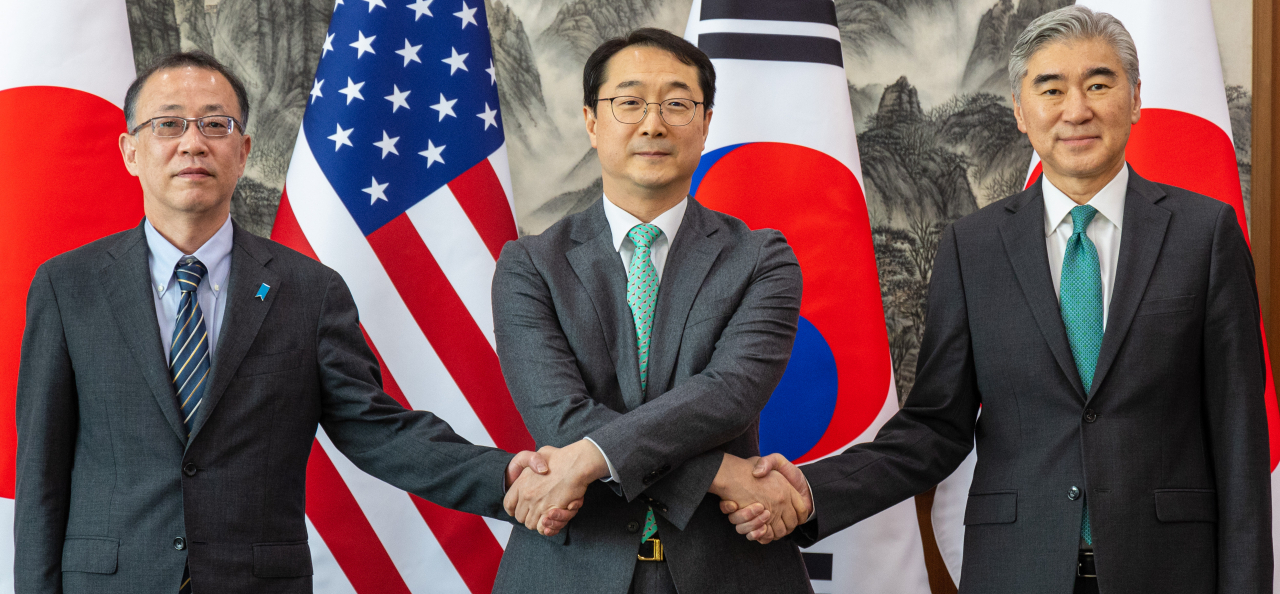Nuclear envoys urge repatriation of NK workers abroad
By Choi Si-youngPublished : April 7, 2023 - 15:08

The chief nuclear envoys from South Korea, the US and Japan called on the international community and countries employing North Korean workers to help repatriate them as per United Nations Security Council resolutions preventing their overseas income from bankrolling the North’s nuclear and missile programs.
At a regular meeting held in person in Seoul on Friday, South Korean chief nuclear negotiator Kim Gunn, his US counterpart Sung Kim and Japanese counterpart Takehiro Funakoshi underscored international efforts needed to block such “revenue streams” used to expand Pyongyang’s weapons programs.
Last month, North Korean leader Kim Jong-un announced that he wants an “exponentially bigger” nuclear arsenal, warning of nuclear attacks against the South and the US if the two allies continue their annual joint military drills. Seoul and Washington see them as checks on Pyongyang, a country facing a string of international sanctions.
Under UNSC resolution 2375, adopted in 2017, member states are required to stop renewing or granting work permits to North Korean workers. UNSC resolution 2397, also passed in 2017, mandated member states to carry out a complete repatriation of North Korean workers abroad by December 22, 2019, unless that was prohibited by national or international law.
But North Korea’s border shutdowns prompted by the COVID-19 pandemic had made it difficult for countries to follow through on the repatriations, leading to an unwarranted hiatus that is now close to being reversed, as pandemic travel curbs are widely being eased.
To remind the international community of the curbs on North Korea’s nuclear ambitions, the chief nuclear negotiators from Seoul, Washington and Tokyo -- who as a coalition have been pushing for North Korea’s denuclearization -- said the international community could do more for disarmament.
“We reiterate with concern that overseas DPRK IT workers continue using forged identities and nationalities to evade UNSC sanctions and earn income abroad,” the three envoys said in a joint statement, referring to the Democratic People’s Republic of Korea, North Korea’s official name.
According to the statement, the UN Panel of Experts estimated that the isolated country had attempted to “steal as much as $2 billion between 2015 and 2019 through cyber means,” via stealing cryptocurrency and coordinating cyberattacks.
In 2022 alone, the North stole up to $1.7 billion in cryptocurrency, the statement added, citing private industry estimates without elaborating on further details.
The envoys urged North Korea to return to nuclear negotiations, the latest of which took place in October 2019. The Washington-Pyongyang meeting fell apart over giving priority to disarmament or sanctions relief. Washington, Seoul and Tokyo seek the former while Pyongyang wants the latter to resume talks.
Meanwhile, Seoul is stepping up efforts to bring Tokyo to its side by proposing ways to move quickly past a historical dispute over Japan’s use of forced labor during its 1910-45 colonial rule of the Korean Peninsula.
A March 6 decision announced by the Korean government skips an official apology and direct compensation from the Japanese companies held liable for damages by a 2018 Korean court ruling, which the firms had refused to recognize. Seoul plans to use Korean company funds to pay the victims, leaving the door open for the Japanese to issue an apology and contribute to the funds.
South Korean Ambassador to Japan Yun Duk-min expressed hope for that to take place, saying the victims do not want money but “true closure” that could heal the wounds.
“I just hope the Japanese think about how Koreans would view their response,” Yun said Friday in an interview with the Tokyo Shimbun. Skeptics have slammed the March deal, saying Seoul is being too soft on Tokyo because Japan has been officially asked for neither a formal apology nor direct compensation for the wartime rights abuses.
The Yoon Suk Yeol administration believes it has taken enough initiative in settling the feud, proactively mending the strained ties and opening the way for bigger exchanges to follow. But Japan is reluctant to add anything to its previous stance that the issue was already resolved by a 1965 treaty that normalized bilateral ties following Seoul’s independence from Tokyo in 1945.
On the sidelines of Friday’s meeting on North Korea, Funakoshi, the Japanese chief nuclear envoy, held talks with his South Korean counterpart exclusively dealing with Korea-Japan affairs to discuss finding a middle ground on the labor issue. The Foreign Ministry in Seoul, however, offered no details over what the two discussed. They “exchanged ideas” with plans for more meetings, it said in a statement.




![[Herald Interview] 'Amid aging population, Korea to invite more young professionals from overseas'](http://res.heraldm.com/phpwas/restmb_idxmake.php?idx=644&simg=/content/image/2024/04/24/20240424050844_0.jpg&u=20240424200058)













![[KH Explains] Korean shipbuilding stocks rally: Real growth or bubble?](http://res.heraldm.com/phpwas/restmb_idxmake.php?idx=652&simg=/content/image/2024/04/25/20240425050656_0.jpg&u=)

